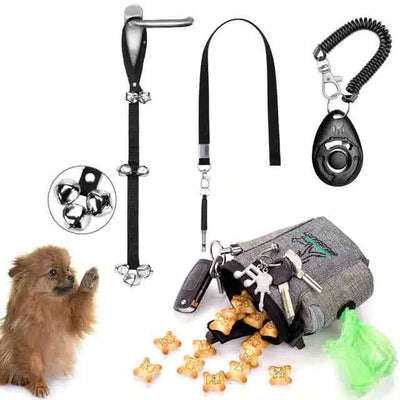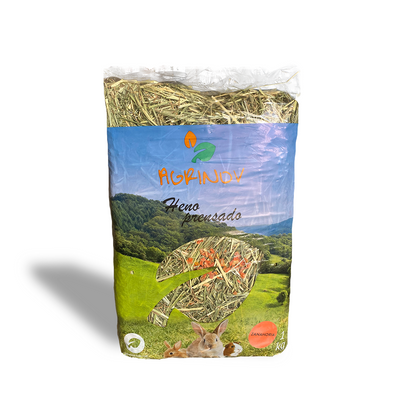Can a dog have an allergic reaction? The answer is yes and it is a fact that is more common than we imagine. An allergy is a defensive reaction of the body to a substance (allergen) that the body recognizes as harmful while it is not harmful to other dogs.
Causes of allergies in dogs
Dogs, like humans, are a species that can suffer from allergies or intolerances. The possible causes of an allergic reaction in these animals are very varied. Despite the large number of allergens that we can find in our environment, it is possible to group them into two large groups:
External Allergens:
External allergens are also known as environmental factors. In this group we find a large number of allergens that come from the environment where the dog develops its life. Some examples of environmental allergens are: plant pollen, fungi, insect bites, shampoo, household cleaning products... There are a large number of possible allergens and identifying them is not an easy task.
Internal allergens:
Internal allergens are usually foods or some component of the dog's diet. The most allergenic foods that we can find in most dog food are: wheat, soy, milk, chicken or beef.
Allergies or intolerances do not have to be born, in many cases the dog's body develops them over time. This is due to a reaction of the animal's immune system to the allergen.

Allergy symptoms in dogs
There are several symptoms that can lead us to think that our furry friend has an allergy to something. These symptoms do not have to be the same in all dogs and can also vary depending on the animal's degree of intolerance to a specific allergen. If you notice that your dog suffers from any of the following symptoms, it is very likely that he suffers from some type of allergy or intolerance and we recommend that you visit your veterinarian for more information.
- Itching in the area of the face, ears, armpits, groin or the part near the anus
- Pimples, scabs and bumps appear in these same areas
- Visibly inflamed, peeling and red skin
- Digestive problems (vomiting or diarrhea), in the case of food allergy
If you see that your pet has decomposition or vomiting after eating, it is easy to associate it with a food allergy, however, it is not always so easy to find the allergen that is causing the aforementioned symptoms.

What can I do if my dog has an allergy?
The first thing we should do when we suspect that our pet has suffered an allergic reaction is to try to identify the allergen that caused it. As we have mentioned before, there are two types of factors that can cause this reaction in dogs. The environmental or external ones and the nutritional or internal ones.
To identify the allergen, you must observe when it has reactions and what factors it has been exposed to. An example could be seasonal allergies. If you notice that during spring or after a walk in the countryside, your pet scratches more than normal, it is very likely a reaction caused by pollen or plants. Another example could be allergies caused by household hygiene products. If you notice that your friend has any allergy symptoms after having scrubbed the floor of your house, it is very likely that one of the components of the detergent was the cause of the reaction.

If the cause of the allergy is an internal or dietary factor, it is likely to be more difficult to identify. To identify allergens in food, the most common thing is to resort to a discard diet. These diets consist of using a feed that does not contain those ingredients that are suspected of causing the allergy.
One of the most common food allergens among dogs is usually grains. So the first step would be to start giving your dog a grain-free food . If after using a feed that does not contain grains, you notice that your pet suffers the same symptoms, it is likely that the cause of its intolerance is the animal protein contained in the food.
One of the proteins that usually causes the most allergies is chicken. In this case we recommend using hypoallergenic monoprotein feed (with a single ingredient of animal origin). The most normal thing is that with this type of food your pet will no longer have food allergy problems, although it may not be enough. If they also suffer a reaction to monoprotein feed, you should use hydrolyzed protein feed, since their particles are so small that the immune system does not identify them as an allergen. If you want to learn more, we recommend that you consult this post on hydrolyzed proteins from the Uma Blog.

What dogs suffer from allergies?
Absolutely every dog can develop an allergy. However, there are certain breeds or types of dogs that tend to have them more often: Beauceron, Boston Terrier, Boxer, Shar Pei, Cocker Spaniel, Dalmatian, English Bulldog, Golden Retriever, Labrador Retriever, Shnaucer, Pug, West Highland White Terrier, fox terrier, yorkshire terrier.
White or albino dogs are also usually more prone to suffering from both environmental and food allergies.
Some hypoallergenic dog food
That's all for today =D If you have any questions or would like us to answer your questions in future posts, contact us. We will be happy to help you!











